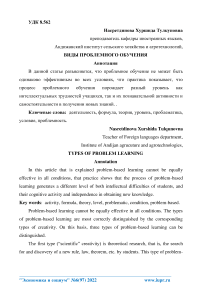Types of problem learning
Автор: Nasretdinova X.T.
Журнал: Экономика и социум @ekonomika-socium
Рубрика: Основной раздел
Статья в выпуске: 6-1 (97), 2022 года.
Бесплатный доступ
In this article that is explained problem-based learning cannot be equally effective in all conditions, that practice shows that the process of problem-based learning generates a different level of both intellectual difficulties of students, and their cognitive activity and independence in obtaining new knowledge.
Activity, formula, theory, level, problematic, condition, problem-based
Короткий адрес: https://sciup.org/140298881
IDR: 140298881 | УДК: 8.562
Текст научной статьи Types of problem learning
Problem-based learning cannot be equally effective in all conditions. The types of problem-based learning are most correctly distinguished by the corresponding types of creativity. On this basis, three types of problem-based learning can be distinguished.
The first type (“scientific” creativity) is theoretical research, that is, the search for and discovery of a new rule, law, theorem, etc. by students. This type of problem- based learning is based on the formulation and solution of theoretical learning problems.
The second type (practical creativity) is the search for a practical solution, that is, the search for a way to apply known knowledge in a new situation, design, invention. This type of problem-based learning is based on the formulation and solution of practical learning problems.
The third type (artistic creativity) is an artistic representation of reality based on creative imagination, including literary compositions, drawing, writing a piece of music, playing, etc.
All types of problem-based learning are characterized by the presence of reproductive, productive and creative activity of the student, the presence of a search and solution to the problem. They can be carried out with various forms of organization of the pedagogical process. However, the first type is most often found in the classroom, where there is an individual, group and frontal problem solving. The second - in laboratory, practical classes. The third type is in the classroom and in extracurricular activities.
It is quite clear that each type of problem-based learning, as an internally differentiated activity, has a complex structure, which, depending on many factors, gives different learning outcomes.
Each of the listed types of problem-based learning can proceed with a different degree of cognitive activity of the student. Determining this degree is important for managing the process of forming students' cognitive independence.
Each type corresponds to one of the most important conditions for problembased learning - the presence of a certain level of cognitive independence of the student.
Having studied the psychological and pedagogical literature on issues of problem-based learning, we found out that it is called problem-based not because students learn all the educational material only by independently solving problems and “discovering” new concepts. Here there are explanations of the teacher, and the reproductive activity of the teacher, and the setting of tasks, and the performance of exercises by students. But the organization of the educational process is based on the principle of problems, and the systematic solution of educational problems is a characteristic feature of this type of education. Since the whole system of methods is aimed at the comprehensive development of the student, the development of his cognitive needs, the formation of an intellectually active personality, problem-based learning is truly developing.
Problem-based learning is based on the principle of problematicity, implemented through various types of learning problems and through a combination of reproductive, productive and creative activities of the student.
Should all learning be problem-based?
Not all, if by problem-based learning we mean only the solution of educational problems and only the independent assimilation of all educational material. All learning should be developmental, in which independent assimilation of knowledge by solving educational problems, through discoveries is combined with the reproductive assimilation of knowledge presented by the teacher or student. The student cannot and should not repeat the entire historical path of the development of human knowledge. But he must repeat the principles of this development and the generalized modes of action in order to assimilate them and develop in himself methods of creative activity.
Problem-based learning means to understand it as a type of learning that provides, in combination with the traditional and the new that has been introduced into pedagogy by many researchers and practitioners, the development of the entire set of feelings and reason, the student's thinking and his memory, the development of a holistic, intellectually active personality.
Education cannot be considered developing if the patterns of problem-based learning (principle of problematicness, problem situation) are not used.
Thus, the problematic type of education does not solve all educational and educational tasks, therefore it cannot replace the entire education system, which includes different types, methods, and organization of the educational process. But also the system of education cannot be truly developing without problem-based learning.
Are problem-based learning accessible to all students?
We made conclusion above. Almost everyone. However, the level of problematicity and the degree of cognitive independence will vary greatly depending on the age and individual characteristics of students, on the degree of their training in problem-based learning methods, etc.
The list of used literatures.
Список литературы Types of problem learning
- Makhmutov M.I. Problem learning. Basic questions of theory.-M.: Pedagogy, 1975.
- Matyushkin A.M. Problem situations in thinking and learning. - M.: Pedagogy, 1972.


